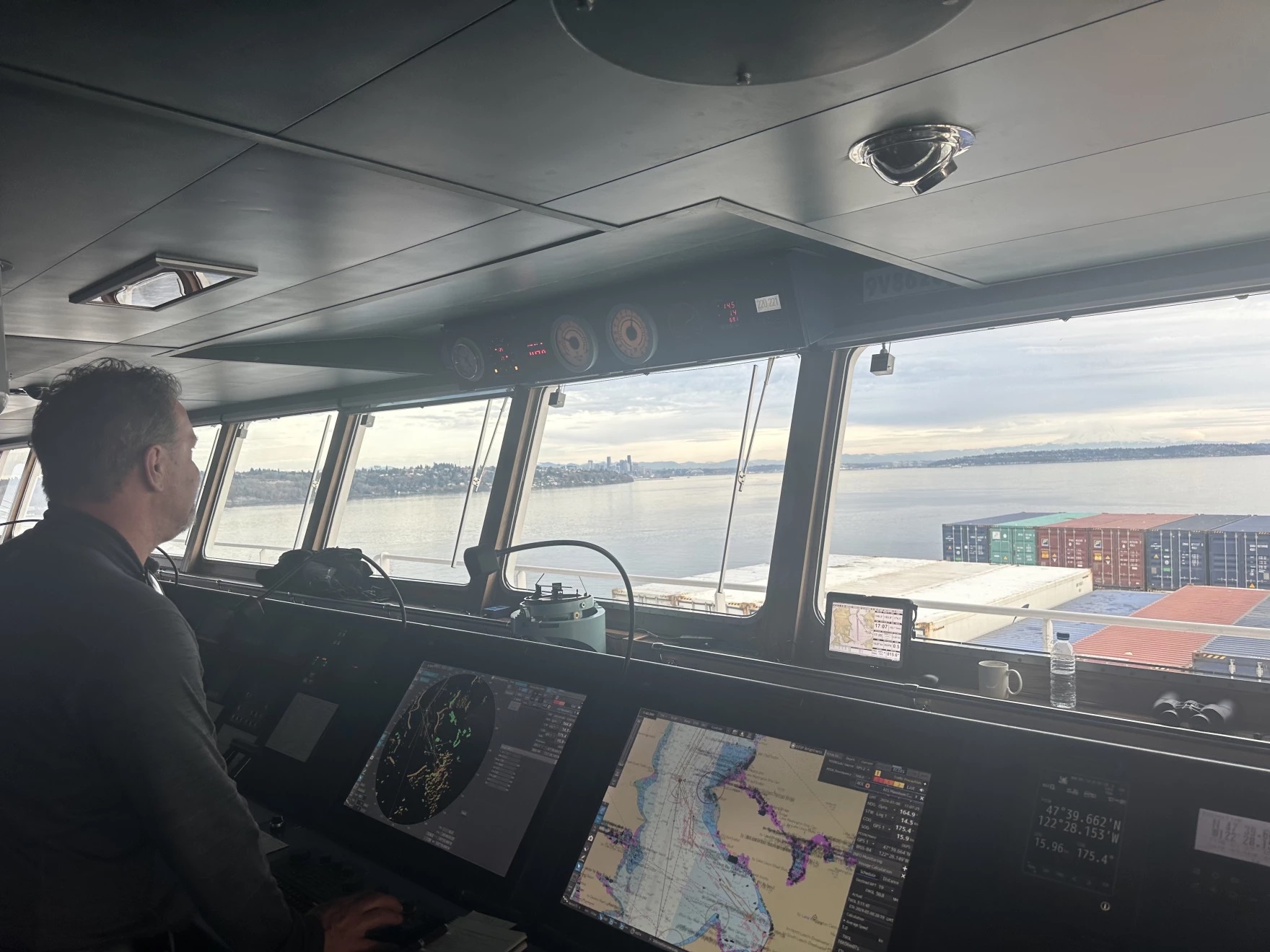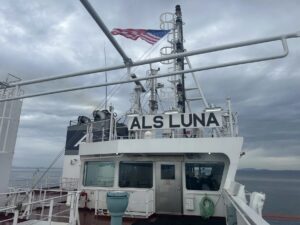

In Washington State, the U.S. Coast Guard has launched a pilot program to alert ships to whale sightings in the Salish Sea and Puget Sound.
The goal of the agency’s new Cetacean Desk is to try to better protect marine mammals from boat strikes and underwater disturbances in the busy waterways in and around Seattle.

In the Strait of Juan de Fuca, captain Rodney Myers stands on the bridge of the ALS Luna. He’s a Puget Sound Pilot. By state law, local pilots have to guide commercial ships that come from abroad, to make sure they navigate safely through the maze of waterways in in the area.
Today, it’s a massive container ship piled high with goods from China, headed for a berth at the Port of Seattle. Myers directs a mate at the wheel and a lookout who helps scan for traffic and also wildlife.
“If I see a whale — that’s what our lookout is for— if I see a fin or whatever, I’ll alter course to keep well clear,” he said.
But captain Myers says those fins can be really hard to see, so he relies on the Coast Guard. With a ship this huge, about the size of a 10-story apartment building, it can take half an hour to turn safely.
“If they can tell me that there’s a whale at, say, Port Townsend, I can prepare for that early,” Myers said.
RELATED: Study reveals 30% decline in Alaska humpbacks in last decade
For years now, the maritime community has been using multiple crowdsourced apps to track whales and orcas and try to avoid them. But they haven’t worked very well.
Under pressure from environmentalists and a congressional mandate, the Coast Guard is stepping up to help improve one of the most used whale report apps, WRAS.
The new system will combine sightings reports with information from underwater listening devices, creating one integrated database that will alert commercial vessels and ferries. The alerts will not go out to private or recreational boats.
Lieutenant commander Margaret Woodbridge, the cetacean desk manager, said WRAS also forms the basis for Canada’s alert system, called the Marine Mammal Desk.
“Us adopting this program – it provides a consistent notification and reporting process for mariners throughout the Salish Sea on both sides of the border,” Woodbridge said.
Woodbridge showed me a room full of monitors. Here, Coast Guard personnel alert mariners about weather conditions, environmental hazards and traffic. She said these watch standers are also looking for whale reports to feed into the new system.
“They can just take a few pieces of information – vessel name, species, any specific behavior or direction of travel – hand it off to this watch stander right here who then enters that in and sends the report out,” Woodbridge said.
RELATED: Humpback whale calf found dead near Juneau was killed by a large boat, biologists say
The program is designed to reduce the impact of marine traffic on threatened and endangered whales from two things – vessel strikes and underwater noise, which is especially problematic for the region’s critically endangered southern resident orcas. That’s because orcas echolocate.
Noise from fast-moving ships can make it hard for them to find food and communicate. Researchers have also seen it cause higher levels of stress hormones. There are now just 74 southern resident orcas left in the wild.
“Just the simple presence of ships can cause whales to forage less or to avoid important foraging areas,” Woodbridge said.
The hope is that the new cetacean desk will bring in reports from new sources, including nearby U.S. Navy assets.
Whale researcher John Calambokidis said he welcomes the Coast Guard’s effort, but he’s concerned that this new system relies too heavily on data about whales that people see and report.
“People just have to realize the strengths and limitations of this particular reporting scheme is that it heavily emphasizes areas where there are humans and whale watch(ers) that can report these sightings,” Calambokidis said.
He said many ship strikes happen where there are no people, or at night or in bad weather. And the captains often don’t even realize it’s happened.
The Coast Guard said it’s working with nonprofits to eventually add technologies, such as machine learning and thermal imaging, to expand the system’s whale-detecting capability.
This story has been republished with permission from the original at KNKX.org.
…
Continue reading this article at;
https://alaskapublic.org/2024/03/25/new-coast-guard-alert-system-aims-to-reduce-the-number-of-whales-hit-by-vessels/
https://alaskapublic.org/2024/03/25/new-coast-guard-alert-system-aims-to-reduce-the-number-of-whales-hit-by-vessels/
alaskapublic.org
Feed Name : Alaska Public Media
Economy,Environment,National,News,Top Stories
hashtags : #Coast #Guard #alert #system #aims #reduce #number #whales #hit..
